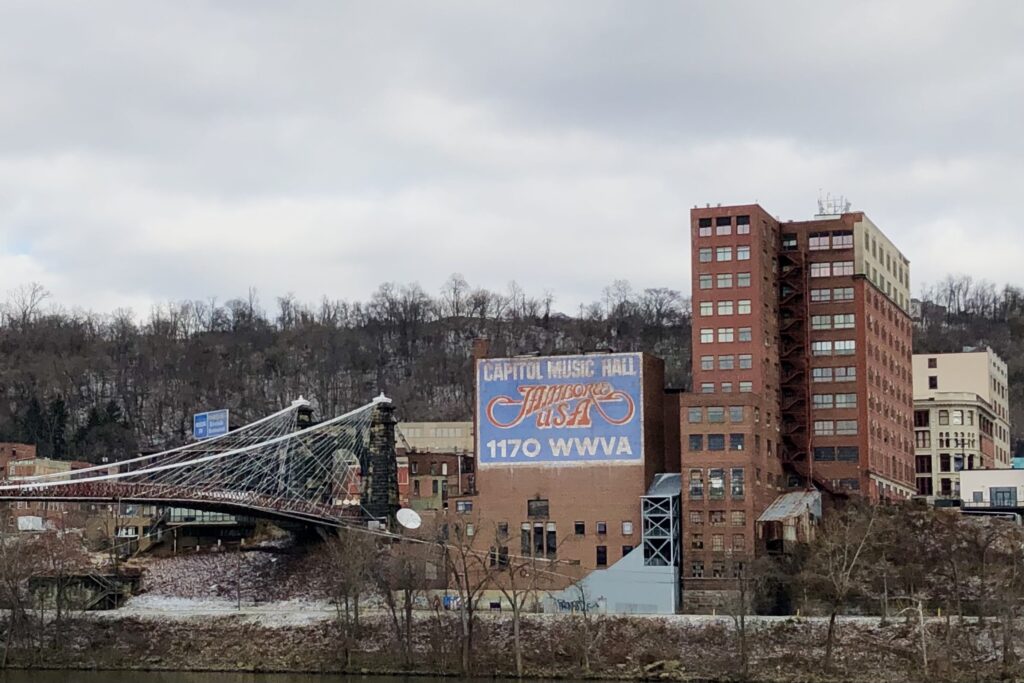Wheeling, West Virginia is home to one of the oldest and most successful country music radio shows in history. Although it has gone by several names, the Wheeling Jamboree launched and showcased country music’s biggest stars since its start in 1933. During its heyday, the Wheeling Jamboree brought in millions of dollars-worth of business to the Wheeling area along with a vibrant musical life that could only be rivaled by the Grand Ole Opry. Being a Wheeling native, I wanted to learn more about the history and future of the Wheeling Jamboree.
The Wheeling Jamboree welcomed country’s brightest stars, including Charley Pride, Loretta Lynn, Johnny Cash, Doc and Chickie Williams, and Brad Paisley, and broadcasted their talents to radio waves across the country and Canada. Doc and Chickie Williams were the power couple of the Wheeling Jamboree. Dubbed the “ambassadors” of Wheeling, their success at The Jamboree enabled them to produce numerous albums and tour around the country. First appearing on The Jamboree in 1937, their time on the Capitol stage cemented their legacies as country music icons in West Virginia. More recently, Brad Paisley began his music career at The Jamboree at the ripe age of twelve. Dave Heath, the current president of The Jamboree, described Paisley as a “living testament to success of The Jamboree.” After attending countless shows as a kid, Paisley regularly performed at The Jamboree throughout the 80s, before becoming one of country music’s biggest stars.

Wheeling was once a major industrial center with thriving factories and a bustling downtown—a stark contrast to the Wheeling I experienced. Growing up, my mom and uncle told stories about the excitement of taking the bus from their home in Shadyside, Ohio to Wheeling: the big city filled with department stores, crowded streets, and a flourishing music scene. It sounded like my experience growing up in Wheeling and taking a trip to Pittsburgh. It always felt far away both in terms of distance and culture. Due to Wheeling’s steady population and economic decline, I struggled to imagine my hometown as a bustling city and a hub for country music. Over the course of my mom’s upbringing, Wheeling’s prosperous downtown diminished as department stores and small businesses shuttered. The highest rate of population decline took place in the 1980s, around the time my mom’s generation graduated and left the area.
Like the rest of the city, The Wheeling Jamboree experienced its own hardship as it left its longtime home at the Capitol Music Hall and bounced to different locales throughout the Ohio Valley. Despite this, The Jamboree’s long history and strong reputation in country music seem to have secured a stronghold of artist and listener supporters who have enabled it to stay afloat. Although I didn’t always have the brightest, most thoughtful perspective on Wheeling as a teenager, I am amazed by the city’s relevancy to country music. I’ve always loved country music and as my fondness for Wheeling has grown, I’m proud that my hometown played such an important role in the music industry and in so many country stars’ careers.
Although Wheeling and The Jamboree look pretty different from what my mom experienced at my age, both have been undergoing something of a revival. Wheeling has seen a recent surge of new small businesses. Wheeling Heritage has also had a hand in rehabilitating some of the historic, Victorian homes and buildings, bringing new life to the downtown. As a new generation uplifts the economic and cultural life of Wheeling, The Jamboree will shine light on the city’s musical heritage in new ways. Now owned by a local news station, the Wheeling Jamboree can streamed online. Every week, the Wheeling Jamboree gives glimpses into its past with broadcasts of archival tapes of shows (not unlike the virtual events I’ve hosted at Augusta).
Dave Heath shared that the stories and artifacts from The Jamboree’s history will be preserved in a new museum. The Fraternal Order of the Eagles donated its former building to the Jamboree, and after some renovations, it will be transformed into The Jamboree’s museum. I look forward to seeing the story of The Wheeling Jamboree and its contributions to the cultural life of the city in a physical display. Heath pointed out that younger generations in Wheeling don’t always grasp the significance of The Jamboree. Hopefully, the museum serve as both an attraction for the city and a resource for young people to learn about the history of the Wheeling Jamboree.
Listen to the Wheeling Jamboree here: http://wwovfm.com


Did anyone film this live show in 1978